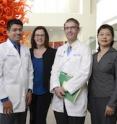UTSW team find up to one-quarter of lung cancer patients ineligible for immunotherapy
A significant proportion of lung cancer patients also have autoimmune disease, which may make them unsuitable for increasingly popular immunotherapy treatments, a team of researchers at UT Southwestern Medical Center's Harold C. Simmons Comprehensive Cancer Center has found. The UT Southwestern cancer researchers calculated that between 14 to 25 percent of lung cancer patients reviewed also had immune disease, and these individuals were more likely to be female and older, according to the findings reported today in JAMA Oncology.
The results are significant because the use of immunotherapy for cancer treatment is expanding, and clinical trials of immunotherapy have routinely excluded patients with autoimmune disease, a population estimated to be between 20 to 50 million people in the U.S., said first author Dr. Saad Khan, Assistant Professor of Internal Medicine in the Division of Hematology and Oncology.
"Our team wanted to determine if this practice had a significant impact. The new immunotherapy treatments also convey the risk of unpredictable, possibly severe, and potentially irreversible autoimmune toxicities affecting a variety of organs. With combination immunotherapy regimens, rates of these adverse events may exceed 50 percent," said Dr. Khan, a member of the Simmons Cancer Center.
"Our findings provide the first robust estimate of autoimmune conditions among lung cancer patients," said epidemiologist Dr. Sandi Pruitt, Assistant Professor in the Department of Clinical Sciences' Division of Outcomes and Health Services Research, and a member of the Simmons Cancer Center. "This study will influence clinical practice and the design of clinical trials, and raise additional research questions of critical importance to lung cancer patients and their doctors."
The researchers studied 210,509 lung cancer patients over age 65 and applied two different algorithms to measure the presence of an autoimmune disease. The most common autoimmune diseases reported were rheumatoid arthritis, psoriasis, and polymyalgia rheumatica.
Potential explanations for the relatively high rate of autoimmune diseases among lung cancer patients include their advanced age at diagnosis and smoking history, which has been linked to risk of certain autoimmune diseases, Dr. Khan said.
Dr. David Gerber, Associate Professor of Internal Medicine and Co-Director of the Lung Cancer Disease Oriented Team at the Simmons Cancer Center, said immunotherapy is one of the greatest medical advances in cancer treatment in the past 30 years.
"Since the use of cancer immunotherapy is growing, examining the effectiveness and toxicity of these promising treatments among patients with autoimmune diseases will be critical," said Dr. Gerber, Co-Director of UT Southwestern's Experimental Therapeutics Program, which aims to identify novel targets for tumor targeting, perform laboratory testing of new treatment strategies, and develop new biomarkers and clinical trials.
"While prior research has suggested that administering immune therapy to patients with autoimmune disease may be feasible, doing so carries the risk of making their disease worse, and requires careful monitoring," he said.
Dr. Gerber said that because patients with lung cancer may be older and more frequently have smoking histories, these findings cannot be generalized to other types of cancer. He also indicated that in this study the proportion of cases requiring immune suppression was not known. In general, patients undergoing immune suppression are excluded from cancer immunotherapy clinical trials.
An autoimmune disorder occurs when the immune system attacks and destroys healthy body tissue by mistake, according to The National Institutes of Health (NIH). There are more than 80 types of autoimmune disorders.
The National Cancer Institute (NCI) estimates that approximately 39.6 percent of men and women will be diagnosed with cancer of any site at some point during their lifetime.
Source: UT Southwestern Medical Center
Articles on the same topic
- Two-drug immunotherapy deemed safe for lung cancer patients, Moffitt study showsSun, 5 Jun 2016, 2:34:05 UTC
Other sources
- Up to one-quarter of lung cancer patients ineligible for immunotherapyfrom Science DailySun, 5 Jun 2016, 2:30:58 UTC
- Report: Quarter of lung cancer patients ineligible for immunotherapyfrom UPISat, 4 Jun 2016, 19:30:55 UTC
- Two-drug immunotherapy deemed safe for lung cancer patients, study showsfrom Science DailyThu, 2 Jun 2016, 15:31:16 UTC
